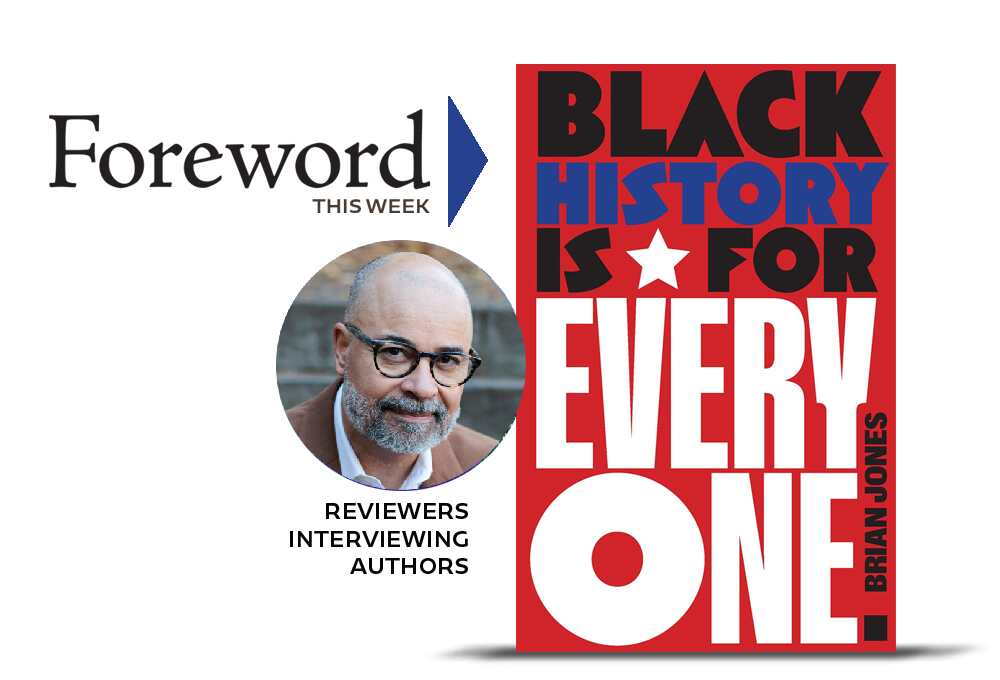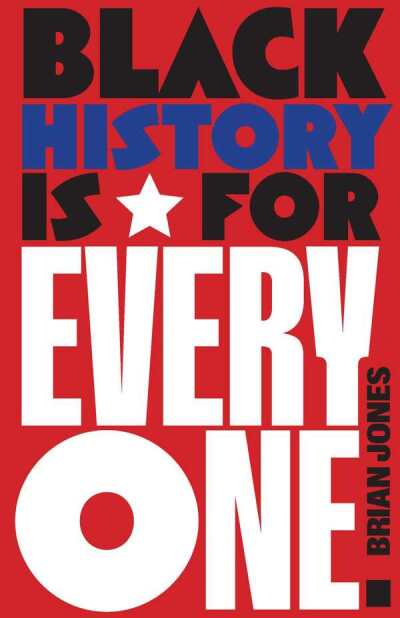Reviewer pine breaks Interviews Brian Jones, Author of Black History Is for Everyone

An often overlooked position of mighty power resides in the white men (almost always) who decide what gets taught in history books and therefore shape the world view of countless children. Is there a more important job on Earth? Why is it so often left to compromised politicians?

Everything you need to know about today’s interview with Brian Jones is conveyed in his title Black History Is for Everyone. We lean on pine breaks to tease out of Brian the reasons our kids—and adults—benefit from a deeper understanding of the Black experience, in addition to a sampling of lesser-known historical events that deserve everyone’s attention.
And with outstanding history books on your mind, check out these four award-winning titles from Foreword’s INDIES Book of the Year awards.
The book makes clear why Black history is for everyone, inviting readers to rethink its scope. How did that framing shape the way you approached your research and storytelling?
Black History Is for Everyone was, in the book’s original plan, the last chapter. That chapter was going to be about the way that the teaching of Black History is perpetually under attack. A Haymarket editor suggested using it as the book’s title and a light bulb went off. With that framing, the whole book came into focus. It became about what I’ve been learning and sharing with students and teachers, and why those ideas are helpful, not just for educators, but for understanding our world, how we got here, and the possibilities for future transformations.
The book challenges simplified or mythologized versions of history. Can you share an example from the book where the fuller truth proved more surprising than expected?
I knew about the history of the Black Panther Party’s rise in Oakland, as an organization committed to defending people from police brutality. I even knew that the idea of a political party with a black panther as its symbol actually came out of the Student Nonviolent Coordinating Committee’s campaign for voting rights in Alabama. I didn’t know, until I started looking into archival documents at the Schomburg Center for Research in Black Culture, that some of the young people in SNCC later came to Harlem and tried to found a Black Panther Party focused on education reform. And as readers will discover, they did so before Huey Newton and Bobby Seale started their own organization in the Bay Area.
In retrospect, this shouldn’t have been surprising at all. One of the most consistent patterns of Black History is the perennial emphasis—even in the most difficult circumstances—on learning, literacy, and building educational institutions. Reflecting on that long struggle helped me think about what was lost in the process of desegregation, to better understand my parents’ memories of growing up in proud Black schools, and how different that was from my experience. Desegregation didn’t have to play out in a way that disempowered black educators and communities, but in too many places it did, and my upbringing was, in part, an example of what it meant to send Black students into historically white schools, while mostly excluding Black educators and the knowledge and traditions they represented.
Were there any chapters or themes you struggled to write, either emotionally or because of the complexity of the history involved?
In the first chapter, I recall stories from my childhood, education, and upbringing, which stirred up a lot of mixed emotions. I felt like I needed to bring some family stories and family history into the narrative and build on the genealogical work that relatives began. For all these reasons, I shared early drafts with my parents. My mom especially had some critical feedback about how I was characterizing things. I wanted to explain the ways I learned to navigate the white world as a young person, but she was concerned that the way I told the story lacked nuance. She wanted me to make sure to acknowledge the fact that all of my teachers weren’t racist, and many were caring and amazing—very true! My father had already documented some painful family histories, especially related to colorism and passing on his side, so I included a few of those details as well, which help to illustrate important patterns and dilemmas Black people have faced in the US. It’s both emotional and a delicate matter to write about painful things when family and friends are involved.
How did your own experiences with learning or teaching history influence the voice and structure of the book?
As a learner, I’ve been most interested in political histories, stories of struggle and social change. As a teacher, I noticed that students really engage with these stories. They are amazed, as I am, to learn how ordinary people have tried—and sometimes succeeded—in turning the world upside down. Power struggles and explosive uprisings shaped the emergence of the idea of race as we know it today. It’s tempting, especially in 2025, to see the world as kind of an undifferentiated history of awfulness, exploitation, and oppression. But how the world works has changed dramatically, and has always been contested. In the book I focus on two big moments of Black-led social transformation that I think are often overlooked: the Haitian Revolution and Radical Reconstruction in the US South.
Was there a particular story or figure you uncovered in your research that stayed with you long after the book was finished or wanted to include but decided against, maybe because of it being too politically charged, for example?
Imagine being kidnapped and brought to an island where cruel people speaking a strange language and inhabiting a strange culture rule over you, you don’t speak the languages of people toiling alongside you, and you are all literally worked to an early death. I can’t get out of my mind the fact that the majority of people who overthrew slavery in the French colony of Saint Domingue and created a new nation, Ayiti (Haiti), were people from Africa who experienced both the kidnapping and the revolution in the lifetime of a single generation—captives who remembered their homelands, not the children or grandchildren of such captives.
Through fourteen years of war and revolution, they fought off the strongest European armies, forged a common language, religion and culture. They broke the wheel of Atlantic racialized slavery and established a new truth in the world, a model of freedom that struck fear in the hearts of enslavers and hope in the hearts of the enslaved. A single generation of Africans! It’s an incredible story, and everyone should know it.
The book addresses the political stakes in the teaching of history. How do you see your work engaging with current debates around education and curriculum?
It’s no secret that Black History is under attack in schools, often in the guise of challenging the bogeyman of “Critical Race Theory.” Meanwhile, anything that smacks of “diversity” or “inclusion” efforts in workplaces is also on the chopping block. I hope this book contributes to their defense and protection. I want people to understand the historical emergence of race and racism (those two are not the same, but are often confused), how central Black people have been to fighting for democracy, and why patriotic framings of Black History are inadequate. That last point is, I expect, the one that might stretch my readers the most.
If a reader could only remember one core idea from Black History is for Everyone, what would you want it to be?
I have many friends and colleagues who are, understandably, defending their work under the slogan “Black History is American History.” There’s a lot of truth to that, but there’s also more to the story. Black History contains plenty of patriotic endeavors and, at the same time, troubles notions of patriotism. When Malcolm X travels to newly independent African nations to recruit allies, or when Audley Moore campaigns for reparations, or when Frederick Douglass criticizes US imperial designs for Haiti, they challenge the idea of the nation as the horizon of freedom. Refusing to confine their loyalties to national borders, these Black leaders can’t be defined only as contributors to proud national accomplishments.
pine breaks
